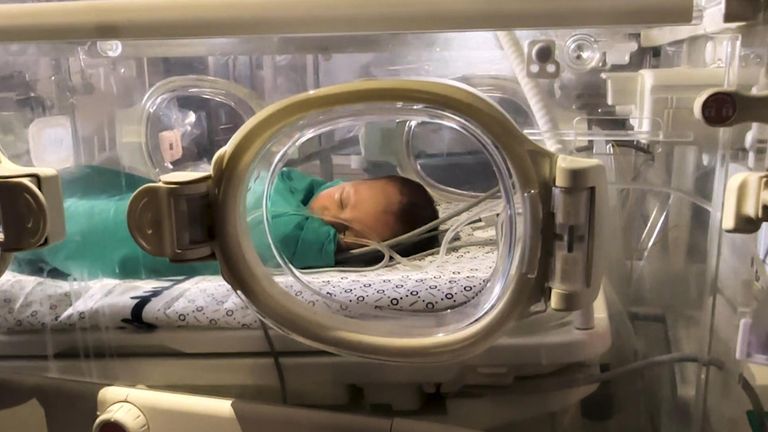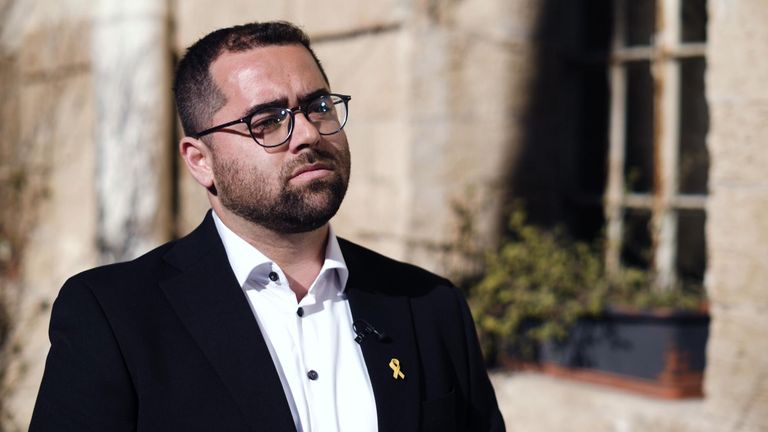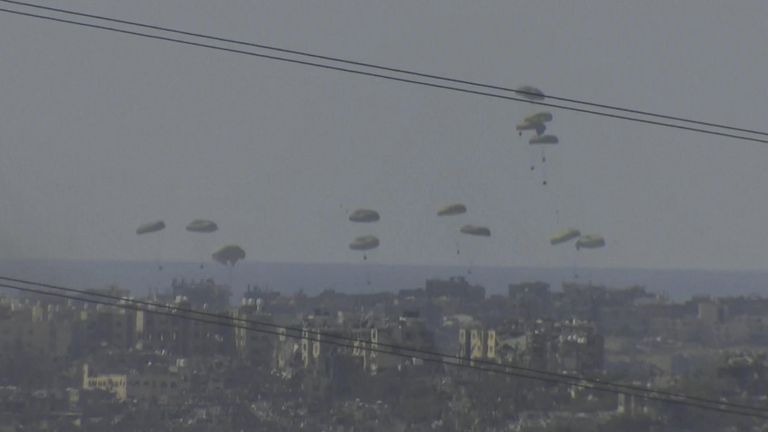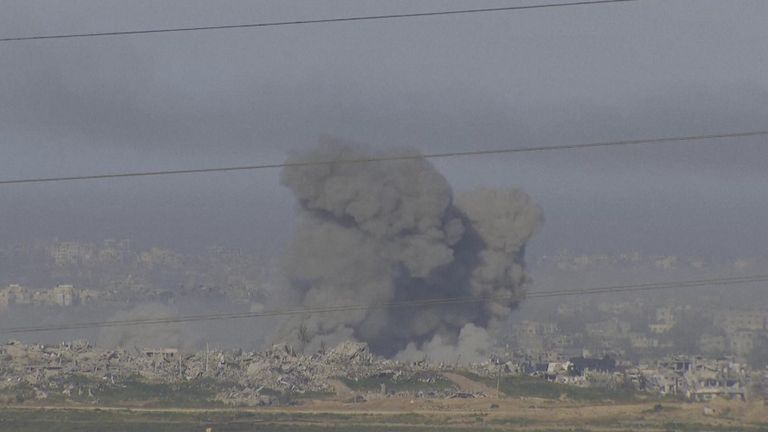In a hospital in northern Gaza, it’s been claimed 13 babies died of malnutrition in a single day last week.
A Sky News camera team has filmed inside the hospital, where treatments are being carried out by the torchlight from mobile phones because the electricity isn’t working.
Mothers being treated there are said to be too malnourished to breastfeed newborn babies, further adding to the crisis.
It comes as Gazan families say they are starving, with aid agencies warning of a looming famine unless significantly more aid reaches the strip, with one charity saying up to 4,000 trucks of aid are needed every single day to make a difference.
Please use Chrome browser for a more accessible video player
0:35
Children in Gaza stage hunger protest
Over the past fortnight, an average of just 102 food trucks have entered Gaza each day.
The United Nations has said hunger in Gaza has reached “catastrophic levels” and the US State Department has described the crisis as “horrific”.
Middle East latest:
US to build Gaza port to deliver aid

Although the Israeli government has said there is no “ceiling” on the amount of aid allowed into Gaza, the Israeli government body in charge of the Gaza border has told Sky News more border crossings could be opened for aid to access northern Gaza directly, if the Israeli cabinet gave them the order.
The US administration has publicly called for more crossings to be opened and the Israeli COGAT (Co-ordinator for Government Activities in the Territories) admitted that could be possible.
“That would be a decision that needs to be made by the government,” Shimon Freedman, a spokesman for COGAT told Sky News.
“If they were to make such a decision, then we would find a way to facilitate their decision. If the directive came from the government, then COGAT would find a way to fulfil that mission. As we’ve done with many different humanitarian initiatives throughout the war.”
It is a notable admission and puts into question the Israeli government’s claim it is doing all it can to allow aid into Gaza.

Shimon Freedman, spokesman for COGAT
‘I cannot feed my children’
Gazans in the southern town of Rafah have told Sky News their families are starving.
“When they distribute meals, a family of 10 gets one serving,” said Rami, a father waiting for food.
“True they are helping people, but it is not enough,” he said. “There are crowds wherever you go: queues to get water, bread, everything.
“Life is so difficult, we can barely get by. I cannot provide for myself.
“I don’t know what to do. I cannot feed my children.”
Please use Chrome browser for a more accessible video player

0:35
Aid airdropped into Gaza
Another parent, Hanafi, described the aid as “a drop in the ocean”.
“Every day there are people who die out of starvation. Every day children are taken to hospitals, but there are no services available because hospitals have no medicine, no beds, no equipment, no treatment. The situation is very bad.”
In recent days Israel has come in for severe criticism by the US, UK and other Western countries over a lack of humanitarian aid being received in Gaza.
Lord Cameron, the UK’s foreign secretary, admonished the Israeli war cabinet member Benny Gantz in a London meeting on Wednesday – saying the warning was “tough but necessary”.
Israel insists it has sped up the process of checks on its side of the border, and says trucks are now backing up in a bottleneck. They blame aid organisations in Gaza for the crisis.
Please use Chrome browser for a more accessible video player

0:29
Explosions seen on Gaza Strip skyline
Challenged on Israel’s responsibility as the occupying power in Gaza, COGAT said the United Nations distributed aid in war zones around the world and Gaza should be no different.
“What Israel is trying to do is work with the international community and with international organisations to make sure that as much humanitarian aid as is necessary is reaching the people in Gaza,” it said.
“The distribution itself is up to the organisations, but we are helping and we are doing what we can to help them do that in a better manner.
“And we’re also trying to find ways to overcome those challenges of distribution, for example, through the airdrops of aid, facilitating those with different countries who are wanting to do that.”
Ceasefire talks falter
A push for a ceasefire before Ramadan starts on 10 March seems to have faltered, with Israel and Hamas blaming each other for the impasse.
Without a ceasefire, it is likely to become increasingly hard to get aid to parts of Gaza and aid organisations are warning of imminent famine.
The French military has joined the Americans, Jordanians, Egyptians and Emiratis in carrying out aid drops, but they are only used as a last resort and it is difficult to ensure the aid gets to the right place.
Sea routes are being explored, with Cyprus being a possible staging post, but that will introduce further problems, with the port in Gaza being out of action and questions of how the ships would have secure and safe passage into Gaza.







